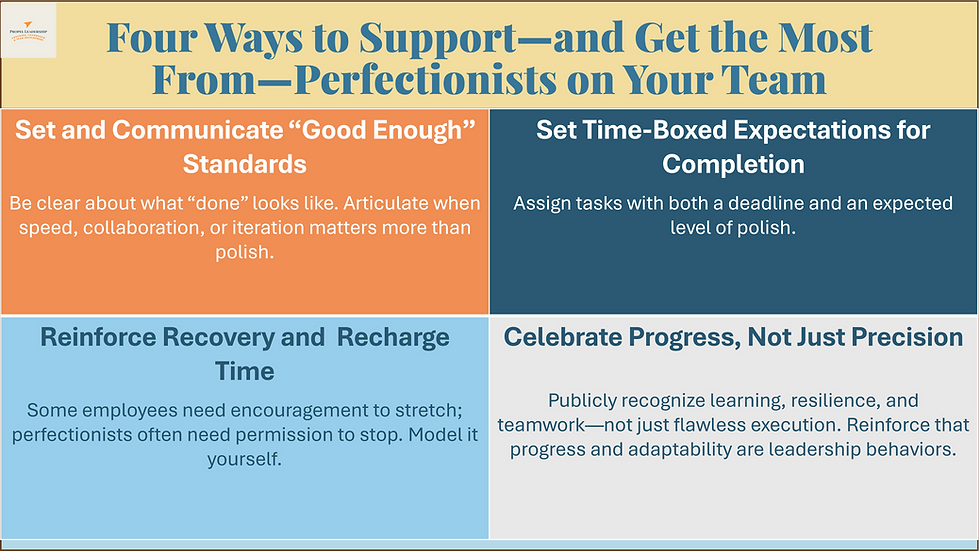When You Manage Perfectionists
- Kevin Sherwood/Propel Leadership
- Jun 11, 2025
- 2 min read
You probably know who they are on your team—the ones who “go the extra mile” by default, not exception. The ones who triple-check every comma, stay late to rework what was already solid, and push themselves harder than you ever ask them to. These are often your most dependable, detail-oriented contributors.
But when their high standards become inflexible perfectionism, their strengths can tip into overwork, delay, or disengagement.
The Double-Edged Sword of the Perfectionist Team Member
Perfectionists can be deeply motivated, conscientious, and willing to do what it takes. But they can also struggle to delegate, have difficulty letting go of work, and resist progress if the output doesn’t feel flawless.
This dynamic can drag down team momentum and energy—especially if left unchecked. More importantly, it can put the perfectionists themselves at risk of burnout or limit their potential by keeping them stuck in execution rather than evolving into more strategic roles.
Four Ways to Support—and Get the Most From—Perfectionists on Your Team
Set and Communicate “Good Enough” Standards: Be clear about what “done” looks like. Articulate when speed, collaboration, or iteration matters more than polish. Perfectionists often assume the bar is higher than it really is—your role is to clarify the actual expectations.
Set Time-Boxed Expectations for Completion: Perfectionists tend to let tasks expand—often unconsciously—well beyond what's needed, giving you as their manager a great opportunity to coach them on strategic trade-offs. James Clear calls this "invisible wasted hours": time spent tweaking and refining details that don’t actually improve outcomes. It’s a common trap made worse by Parkinson’s Law: work expands to fill the time available.
Counter this by setting clear time boundaries. Assign tasks with both a deadline and an expected level of polish. For example: “Give this your best 80% solution in two hours. Don’t aim for perfection—aim for progress.” This signals that speed and scope matter just as much as quality. Over time, you’re helping them reframe success as delivering value efficiently, not flawlessly.
Reinforce Recovery and Recharge Time: Some employees need encouragement to stretch; perfectionists often need permission to stop. Reinforce team norms like no weekend emails, real lunch breaks, or group “cool-down” events like an afternoon walk or end-of-week social time. Model it yourself.
Celebrate Progress, Not Just Precision: Publicly recognize learning, resilience, and teamwork—not just flawless execution. Reinforce that progress and adaptability are leadership behaviors.
When to Bring in an Executive Coach
Sometimes, leaders find themselves struggling to support high-performing perfectionists without enabling unproductive behaviors—or creating tension with the broader team. This is where a third party, like an executive coach, can be invaluable.
A coach can work with you as the manager to:
Clarify how the perfectionist’s strengths can be better aligned to team goals
Strategize how to set boundaries without discouraging motivation
Help you shift the team culture toward sustainable excellence rather than constant overextension
Coach the perfectionist themselves, if appropriate, on how to thrive more strategically
Managing a perfectionist isn’t about lowering standards. It’s about guiding focus. With the right structure and support, they can become a force multiplier for your team, not a bottleneck.







Comments